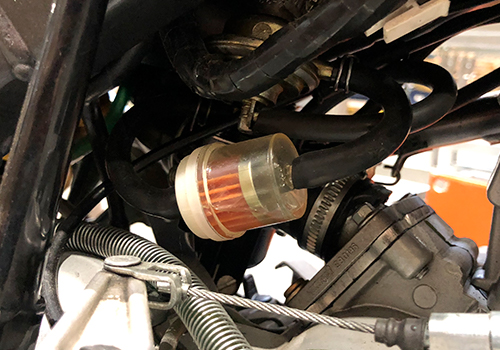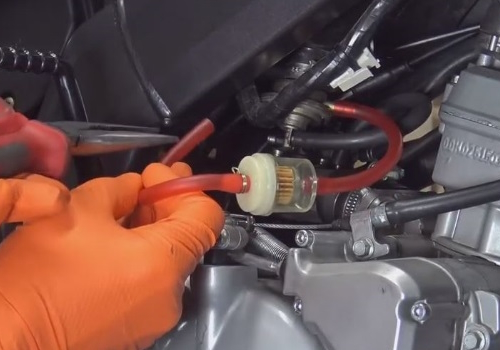
Home > general information > Tips and Guides > Technical guides > Generalists >
HOW TO CHOOSE YOUR FUEL FILTER?
What is the function of the fuel filter?
Le Fuel Filter aims to filter impurities present in the fuel.
The fuel filter is a wise safety measure. With each fill-up, dirt and even, with older models, rust particles can contaminate the fuel, obstructing the float nozzle inside the carburetor.
It is there to retain impurities that may be contained in gasoline, such as residue or rust. Bottom of tank at the pump attendant, gasoline not stabilized and stagnant after having remained too long in the tank, or worse, rust, it is better for the engine that nothing passes into the circuit. power supply to the motorcycle.
It preserves the carburetor as well as the injection system by filtering particles, which are very sensitive to the purity of the fuel. The impurities can come from: residues from the production of the vehicle or from a repair on it; of impurities inputs par the tank ventilation system; oxidation in the tank or supply pipes; water condensation in the tank.
Beyond the filtration function, the device can also optimize the flow of gasoline and thus maintain or improve engine performance. A point not to be overlooked if you are looking for the full potential of your vehicle.
A filter is also designed to filter more or less fuel at a certain pressure for a specific period of time which can go up to a maximum flow rate of 2800 liters/hour at 3 bars (not for motorcycles). The other quality of the filter is precisely that it filters up to 7 microns for some.
 When should the fuel filter be replaced?
When should the fuel filter be replaced?
The fuel filter becomes clogged over time and ends up par no longer being able to properly carry out their role. Several symptoms may appear and alert you:
A more tedious start: if your two-wheeler struggles to start, it is possible that the clogging of your fuel filter is reducing the fuel flow.
Jerks when accelerating: obstruction of the filter can generate an irregular fuel flow and cause jerks during acceleration phases.
Difficulty increasing engine speed: when the level of filter clogging is significant, the fuel flow then becomes insufficient to allow the engine to increase speed.
As soon as these symptoms appear, you should check the condition of the fuel filter and replace it if it turns out to be the cause.
The average lifespan of a fuel filter is 1,000,000 km. In reality, this strongly depends on the filter itself, the motorcycle, its age and the quality of the fuel used. It is rare to have to replace it on a recent motorcycle, its lifespan can go well beyond 1,000 km, especially if it is a high performance filter.
On an older motorcycle, corrosion can form in the tank and cause the filter to become clogged much more quickly, thus making it more frequent to replace.
What are the consequences in the event of negligence?
A well-documented maintenance booklet indicates when the fuel filter needs to be replaced. Typically, a replacement is linked to a certain mileage or the age of the vehicle. Failure to comply with these intervals may result in the filter becoming clogged or even impurities entering the engine compartment. If the filter is too clogged, the vehicle does not receive enough fuel, or no fuel at all. This leads to a loss of power or even complete engine failure.
What are the different types of fuel filters for two wheels?
The in-line fuel filter: This is the most commonly used fuel filter, it is installed "in-line" directly on the fuel hose. It is generally made up of paper fins positioned on a cylindrical or conical plastic or metal cartridge, on the same principle as the oil filter.
The filter integrated into the fuel pump: It is part of the fuel pump and depending on the model it can be replaced individually. It comes in the form of a grid or a sponge.
The sock filter: Generally reserved for motorcycles cross, enduro and certain motorcycles trail, the sock filter looks like a small bag / net that takes place at the inlet of the tank. It constitutes a first level of filtration as soon as the fuel arrives in the tank and thus protects the entire supply circuit.
Some selection criteria
Filtration capacity: Filtration capacity is a crucial aspect when choosing a fuel filter. Fuel filters are designed to trap impurities in fuel, such as dirt particles, rust and other contaminants. Be sure to choose a fuel filter with appropriate filtration capacity for your vehicle. Premium fuel filters provide more efficient filtration and better protection for your engine.
Durability: Durability is another important aspect to consider when choosing a fuel filter. Fuel filters must be able to withstand harsh operating conditions and maintain their effectiveness for a long period of time. Look for fuel filters made from high-quality materials and with features like strong housings and durable filter elements.
Compatibility: Make sure you choose a fuel filter that is compatible with your vehicle. Fuel filters are specifically designed for different vehicle models and engines. Check the fuel filter specifications and match your vehicle's requirements for size, flow rate and connection. Incorrect compatibility could compromise the effectiveness of the filter and even damage your engine.








